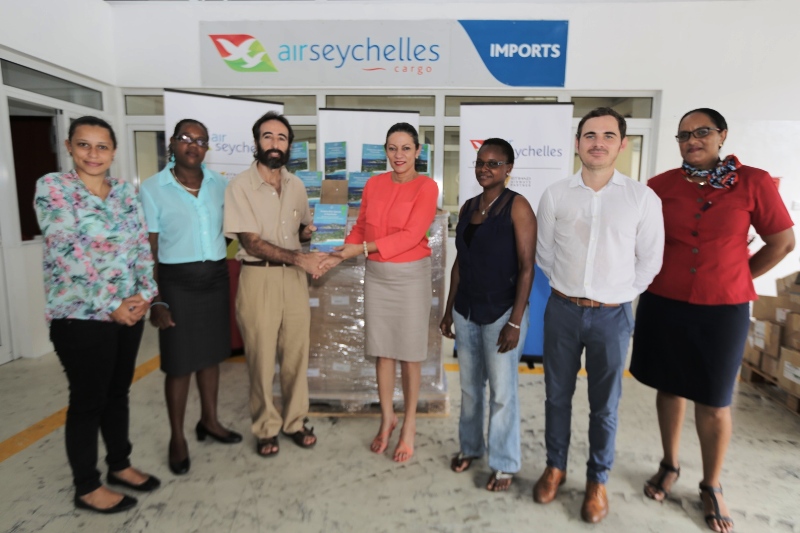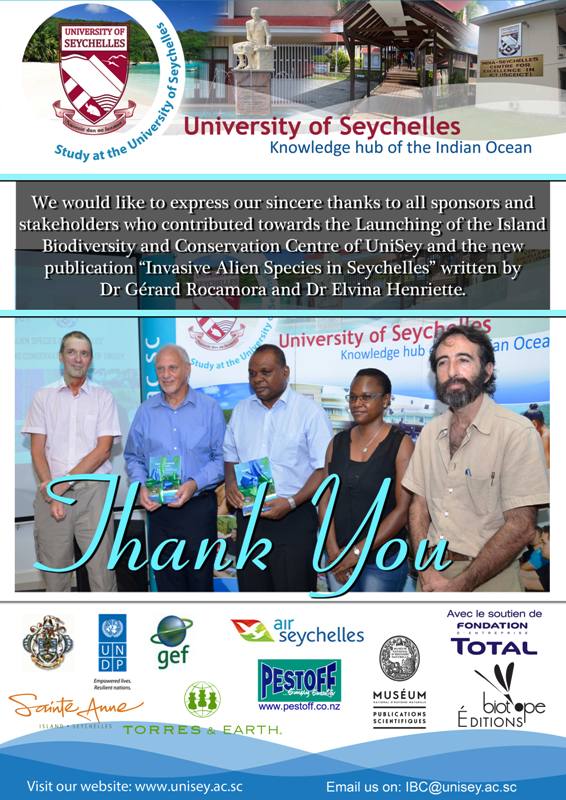Island Biodiversity and Conservation Centre of UniSey: |06 February 2016
More than just a conservation organisation
Although in existence since December 2014, the Island Biodiversity and Conservation Centre(IBC) of the University of Seychelles (UniSey) was only launched on Friday January 22 by the Minister for Environment, Energy and Climate Change Didier Dogley.
Two of its founders, Doctors Gerard Rocamora and Elvina Henriette, had in fact chosen to launch another of their initiative – their book entitled ‘Invasive Alien Species of Seychelles’ at the same time at the Guy Morel Institute, Ma Joie. Other than UniSey, the two prominent conservationists have partnered with other members of the Seychelles’ scientific community in order to realise the project. Kelly Hoareau has joined them to form the current management committee.
Minister Dogley has described the centre as “a major achievement” as he adds “for many years Seychelles has depended on foreign universities and NGOs to conduct research”, adding that “there is a clear need for research to be done here”.
“You cannot manage what you cannot measure. UniSey is the best place to conduct research. This is very strategic as many people have been trained and others are still being trained to do research,” the minister pointed out.
For UniSey’s vice-chancellor Denis Hardy, the launch of the centre is a “great event”.
“It is one of the most important things that have happened to UniSey as it is a partnership with renowned scientists, a mission to deliver knowledge andto contribute to environment protection,” he said.
General context and aims
Seychelles already has a lot of local valuable expertise in the field of biodiversity studies and conservation science, although it is scattered across many individual and local organisations or islands. In parallel, the UniSey is a national project that is extremely important for the development of the Seychelles’ society and the country as a whole. This challenging project requires the contribution of all and everyone. At the Faculty of Sciences and Humanities, a BSc course on environmental sciences was initiated three years ago and has to date has produced 17 local graduates in the field.
In 2015, the Blue Economy Research Institute (BERI), which depends entirely from the UniSey, was formed with the objective of developing research activities in this field. Although the IBC is registered as an NGO, it is closely linked to the BERI, as both share the objective of willing to develop and support the UniSey in terms of research, publications of results and academic curricula. The IBC will however be more focused on biodiversity studies and conservation science.
The aim of the IBC is to encourage the different experts, environmental scientists and practitioners working in Seychelles to be part of a same team and contribute to the development of our university. Having one foot in the university and one foot outside, the IBC is expected to help develop the collaboration between the UniSey, local organisations and private islands of Seychelles, and also boost international cooperation with foreign universities and other scientific institutions.
The IBC may provide advice and guidance to develop joint biodiversity and conservation projects, or joint publications. Its activities will result in scientific and technical publications associating the UniSey being produced every year in the field of biodiversity and ecology. IBC members are encouraged to contribute to the lecturing and student supervision capacity of the UniSey, and to the development of new curricula in environmental sciences.
How is IBC-UniSey different from other conservation organisations?
The IBC of UniSey is not only a conservation organisation. It is registered as an NGO associated to the UniSey. It is composed of environmental scientists, lecturers and conservation practitioners from both Seychelles and abroad who wish to be linked to the University of Seychelles and to contribute to its development. Its mission is to promote scientific studies, apply ecological research and conservation programmes on island biodiversity, contribute to the development of university modules and local capacity in Seychelles and beyond, and disseminate results through publications and participation in conferences.
Its objectives/areas of activity:
- • To build a group of environmental scientists and conservation practitioners co-opted by - or affiliated to - the UniSey, willing to contribute to its development in the fields of island biodiversity and conservation.
- • To promote and where appropriate undertake biodiversity inventories, monitoring schemes or other ecological studies in collaboration with other organisations.
- • To produce or contribute to scientific or technical publications in the field of biodiversity conservation and environmental sciences, and to represent the UniSey in international scientific events.
- • To publish results from biological surveys or ecological programmes and to valorise advances made in Seychelles in the fields of island biodiversity and conservation.
- • To be part of the environmental component of a Research Unit for the UniSey.
- • To support the implementation of international research programmes on ecological processes and monitoring protocols related to biodiversity conservation.
- • To provide scientific and technical guidance on environmental management, conservation and restoration programmes for key biodiversity species, sites and habitats, and where necessary play an active role in their implementation.
- • To develop the lecturing and student supervision capacity of the UniSey for its curricula in environmental sciences; and to help the university to develop - or participate to - new national or international curricula in this field.
- • To network and develop exchanges with foreign scientific institutions interested in biodiversity conservation and capacity building, particularly in the Indian Ocean, and where appropriate to be affiliated to such international institutions.
- • To be a repository of ecological samples, data, research results and publications for the UniSey and any other national or international institutions that may have such interest.
- • To raise/access funds and develop strategic partnerships in order to reach the main goal and objectives of the association.
Membershipmay include university personnel or students. Members may benefit from scientific, technical or administrative support to access funding and implement particular projects, to publish articles or books on results of research or conservation programmes, surveys, inventories and monitoring schemes, or to attend international events to represent UniSey or the Seychelles’ conservation and scientific community.
Organisation membership/partner organisations
Member organisations can include local or foreign organisations and institutions (private, public, parastatal or non-governmental) sharing similar goals and objectives in the field of ecological research and biodiversity studies, nature conservation programmes, and development of local capacity. Companies and institutions that may contribute financially to the association on a regular basis can also become corporate members. Personnel from member organisations will be encouraged to become associate members of the IBC/UniSey.
Current activities and future prospects
The IBC has currently 16 members: 8 core members and 8 associated members.These are also affiliated to foreign research institutions including Musée National d’Histoire Naturelle (Paris), Institut de Recherche pour le Développement (France), Université Libre de Bruxelles, ETH-University of Zurich (Switzerland), University of the Sunshine Coast (Australia), University of Trier (Germany), University of Auckland (New Zealand), CNRS-CEBC (France), University of Uppsala (Sweden), University of Florida (USA). Many of its members are involved in the BSc of Environmental Sciences at the UniSey, or in environmental multi-partner projects involving UniSey.
In 2015, the IBC made possible the publication of the book ‘Invasive Alien Species in Seychelles’, an output of the GoS-UNDP-GEF Bio-security project published by the Musée National d’Histoire Naturelle (Paris) and Biotope Editions (France-Océan Indien). The IBC was also involved with the preparation of a dozen of peer-reviewed scientific articles, two of which have been published (with a first author affiliated to IBC-UniSey). The IBC also attended the International Congress for Conservation Biology, in August 2015 at Montpellier (France), where it represented the university and presented a communication.
The IBC of UniSey is expected to develop projects together with both local and foreign partners. IBC can receive donations and undertake specific biodiversity projects or contractual work for public, private islands/owners or NGOs. Examples of studies and activities that may be conducted include biodiversity surveys in remote areas or islands; monitoring or guidance on wildlife and plant management or restoration protocols; contribution to the recovery of endangered species, etc. IBC will allow UniSey to produce or contribute to regular scientific publications in the field of biodiversity and ecology, and it will help to develop a Research Unit at UniSey.
IBC projects for the period 2016-2017 include the publication of two books, one guide of the Orthoptera of the Seychelles (2017) and one book on the History of scientific expeditions in Seychelles. IBC intends to finalise and start a research project on seabirds with the Island Conservation society (ICS) and a Critical Ecosystem Partnership Fund (CEPF) funded conservation project in collaboration with Ste Anne Island. It also plans to attend the conference on Island Biology to be held in July this year, in the Açores archipelago (Portugal).
In a word, the IBC aims to promote scientific studies, ecological research and conservation.
The IBC has to date received the support of the following organisations: Miguel Torres wines, Beachcomber Ste Anne Resort, Air Seychelles and UNDP (United Nations Development Programme).
The following photos courtesy of Air Seychelles, Monique Pereira and the National Information Services Agency were taken during the launch ceremony.


Source: Dr. Gerard Rocamora
Compiled by Michel Savy




